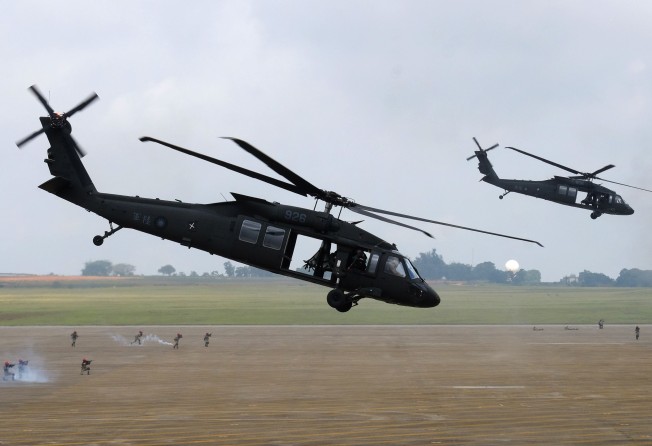US bill calls for Pentagon to send troops to take part in Taiwan military drills
Move comes as island’s annual Han Kuang war games are under way

The US Senate Armed Services Committee has passed a draft bill calling for American troops to take part in Taiwan’s Han Kuang exercise – the island’s most important annual war games – in another move that is expected to provoke Beijing.
The US defence secretary should promote Washington’s policies concerning exchanges that enhance Taiwan’s security, “including US participation in appropriate Taiwan exercises such as the annual Han Kuang” drill and vice versa, according to the 2019 National Defence Authorisation Act. The bill was passed on May 24 but revealed in a report by the Senate on Tuesday.
It comes as the self-ruled island began the second stage of this year’s Han Kuang live-fire military drills on Monday and at a time of heightened cross-strait tensions.
Although the Pentagon has been quietly involved in such exercises for years, analysts said it was the first time the US Senate had proposed in writing that it get directly involved in Taiwanese war games.
The bill also calls on the Pentagon to consider “supporting a visit by an American hospital ship to Taiwan as part of the annual Pacific Partnership mission” to improve disaster response planning and preparedness.
Analysts said the bill takes military links between the US and Taiwan to a higher level, going from advice and training to active participation in drills, and it provides for arms deals to be negotiated on a case-by-case basis rather than as a bundle.
“The US used to consider Taiwan a quasi ally – something close to Nato – and it has been careful to avoid them becoming a military ally out of concern over how Beijing would react,” said Philip Yang, president of the Taiwan Association of International Relations.
Under US President Donald Trump, Congress had become highly vocal in its support of Taiwan and was trying to strengthen military cooperation with the island, he said.
But it was unclear whether the Trump administration would fully comply with the bill, even after it was approved by the entire floor, Yang said.
“I believe if the bill is approved, the Pentagon will take part in some way in Taiwan’s drills, but it remains to be seen how far it will go – whether it will be full participation like in Japan or South Korea, or just a token effort like sending advisers to observe exercises,” he said.
Former Taiwanese defence minister Andrew Yang, who is now secretary general of the Taipei-based Chinese Council of Advanced Policy Studies, said Taiwan was expecting the US to provide more weapons and have more security exchanges.
“This support is not just lip service, but should involve taking action,” Andrew Yang was quoted as saying on Thursday by Taiwan’s semi-official Central News Agency.
Taiwan’s presidential office and the defence ministry on Thursday expressed appreciation for the US Senate’s support for the island’s efforts to safeguard its security.
A military source meanwhile told the South China Morning Post that the US had long sent senior officers to observe Taiwan’s drills, including the Han Kuang exercise.
“It is an open secret that the US sends officers to observe our drills, especially our computer-simulated war games – including the recent one held in the earlier stage of Han Kuang in April,” the source said.
In the past year or so, the US Congress has passed a number of pro-Taiwan laws to show support for the island, including the Taiwan Travel Act and the 2018 National Authorisation Act calling for high-level official and military exchanges.
These actions have angered Beijing, which sees Taiwan as a wayward province subject to eventual unification, by force if necessary. Beijing has warned other countries against supporting Taiwan militarily and suspended official exchanges with the island after Tsai Ing-wen of the independence-leaning Democratic Progressive Party became president in 2016 and refused to accept the “one-China” principle.
Tsai on Thursday visited the Ching Chuan Kang airbase in central Taichung to inspect a drill involving the air force, navy and ground forces repelling a simulated airborne assault by mainland Chinese troops. The president also expressed condolences over the death of an F-16 pilot who was killed when his jet crashed into mountains in northern Taiwan on the first day of the drills. The five-day exercise finishes on Friday.